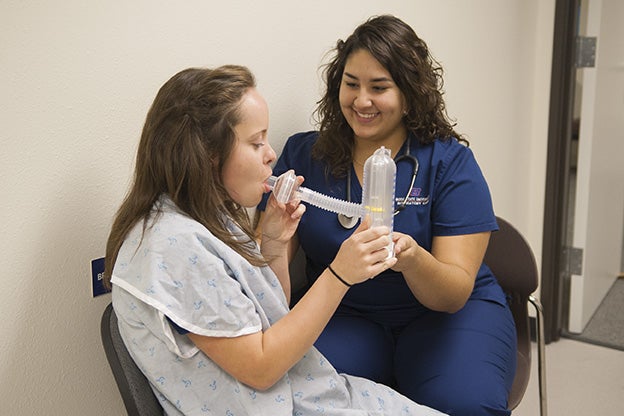
Just before the holidays, the Idaho State Board of Education approved Boise State’s new fully online Master of Science in Respiratory Care program, which will begin in fall 2018. Currently, there are only 12 respiratory care master degree programs in the nation and only eight are offered online for working respiratory therapists.
“The program will have an emphasis in educational leadership, which is designed to capture those students with varying future interests,” said Megan Koster, clinical associate professor and director of Boise State’s Master of Science in Respiratory Care program.
Like many healthcare professions, the profession of respiratory care is in the process of moving to the baccalaureate level for entry into the practice. According to a 2009 survey of respiratory care educational programs, while only one and a half percent of respiratory therapists enter the workforce at the master’s level, 13.5 percent will earn a master’s degree during the course of their careers. There are 119,300 full time respiratory therapists nationwide, which means over 14,000 therapists will advance to the master’s level. With only 12 respiratory care-specific master’s programs in the nation and a maximum capacity of about 280 students per year, most respiratory therapists who want to advance their education through a master’s degree will have to do so in programs of study other than respiratory care; which is not ideal.
“Our goal is to engage those practitioners who are dedicated, interested, and motivated in key areas within our profession to stay in the profession and to be integral in progressing the field through meaningful research and clinical application,” said Koster. “Hospitals, private practitioners, and home care agencies rely on the respiratory therapy perspective when deciding on ventilator weaning protocols, rapid response team structure, smoking cessation programs or critical care transport; “There are a multitude of opportunities awaiting the graduate-level Respiratory Care Practitioner – from bedside consultants in the acute care setting, to community program developers, to academics – the potential is out there and our stakeholders are very excited about the types of advanced skills that our graduates will bring to the table.”
“The level of education required for working in the modern, complex medical environment has been increasing for all Allied Health specialties as they struggle to keep up with advancing expectations, and that is certainly the case for Respiratory Care,” said Joe Coyle, MD, senior lecturer for the Department of Respiratory Care and one of the faculty leaders for the new Master of Science in Respiratory Care program. “As the entry-level workforce moves to the bachelor’s level, master’s prepared respiratory therapists will be needed in educational roles, leadership, advanced clinical practice, and care navigators for patients with chronic respiratory diseases.”
The completely online program will begin in August 2018 and will feature seven week courses, designed with the working clinician in mind. Students will complete 30 credits of coursework and a six credit, research based capstone project.
“The respiratory care graduate students will have a real-life positive impact on patient care through their capstone projects and subsequent contributions to care after graduation,” said Coyle. “These capstone projects can come with a wide range of benefits. In other programs where capstone projects are required, projects have resulted in asthma education in schools, COPD patient screening and education in community health centers, educational projects in middle schools about vaping, protocols for cystic fibrosis patients and websites for exercise induced asthma education for patients among many other great projects.”
“We are extremely excited to get this program off the ground and to meet potential students,” said Koster. “The online, cohort-based format will provide a rich and diverse experience through which students from all over the country can contribute to the growing field of Respiratory Care.”
For more information on the new program visit the Respiratory Care website or contact msrconline@boisestate.edu